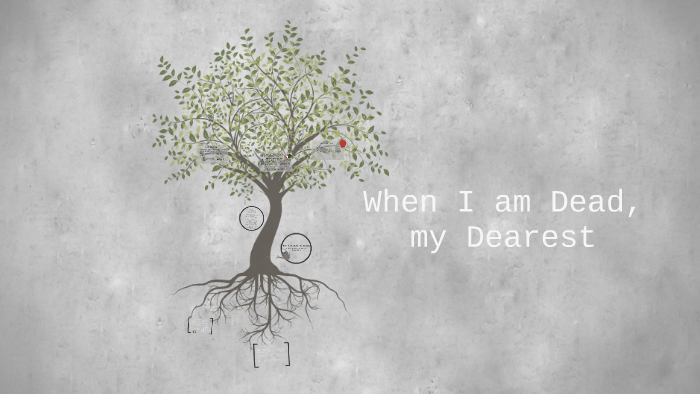


She writes of how she will be “dreaming through the twilight”, and given our associations of twilight- a time between day and night, it seems Rossetti imagines that she will merely be in an in-between stage, rather than in a true life in heaven or hell. Rossetti thus rejects the Pre-Raphaelites’ Anglican moral influences by her subversive reference to the afterlife. She deliberately talks of her partner being “the green grass above me”, which shows that she has no belief of her dead body ascending into a divine afterlife, but rather staying firmly buried under the ground.

There is no sense of celestial bliss or heaven in her mention of what death will be like, with no mention of a desire for a ceremony. In “Song”, as already discussed, Rossetti rejects convention in her pragmatic approach to death, but also consciously rebuffs the traditional religious views of the time. Which broadens her portrayal of her attitudes towards death. Rossetti also addresses the idea of religion in both “Song” and “Remember” Perhaps this is her ploy to make him feel the guilt of trying to control her and through doing so, he will realise his wrongs, and thus been controlled by her, which you could argue as being her object, as the ultimate form of revenge. However, it could be interpreted that here, Rossetti is again playing with the idea of guilt, and that she puts on this apathy in order to leave her partner in limbo to whether to forget or remember her.

She reaches a fatalistic acceptance that she is going to die, and that it doesn’t matter what her partner chooses to do, because she now appreciates that she should not make him “remember and be sad” when he could “forget and smile”, moving on with his life, and not tied to remembering someone who did not love him. It seems she realises that their relationship was flawed and that she didn’t really love this man who tried to control her after all, and so she suddenly does not appear to mind if he “should forget me for a while” and in fact tells him, “do not grieve” if he feels guilty for doing so. However, there is a shift in Rossetti’s tone indicated by the volta, “Yet”, as the sestet begins, moving from this idea of demanding that her partner remember her, to that of indifference to the matter. Clearly, she is using her death as a way to make her partner realise his wrongs, and feel guilty through having to think about her for a change, and the fact that now she is going to have to be in a “silent land” where he can “no more hold me by the hand”. The accusatory tone is emphasised by the spondee on “you plann’d” and the shift from “our” to “you” suggests bitterness. The use of the imperatives therefore may be Rossetti now trying to reverse these roles and control him, because of her resentment towards him “You tell me of our future that you plann’d”. However, these lines also reveal a flawed relationship, whereby she had been controlled by her officious partner. It could almost suggest that she is scared of death, realising that she will be “Gone far away” and have no contact with earth again, and “Nor I half turn to go, yet turning stay” reflect her unwillingness to die, and a sense of fear of it. Immediately, her perceptions of death seem to be that it is a final thing, hence she needs her partner to be sure to remember her, using this same imperative verb three times in the octet. In “Remember”, imperatives are also used to give a sense that she wants her death treated in a certain way, the first line being demanding and insistent, “Remember me when I am gone away”. She ends up the poem in this manner, using the obscurity of “haply, where it might be an archaic type of happily, so she will not be sad, or it could mean “perhaps” showing her casual and invulnerable attitude to whether she passes away or not. This lethargy is simply as effective as the orders to not grieve, as she rejects the standard and obvious emotional strength of the Pre-Raphaelites, showed in poems such as “The Blessed Damozel”, parodying them.


 0 kommentar(er)
0 kommentar(er)
